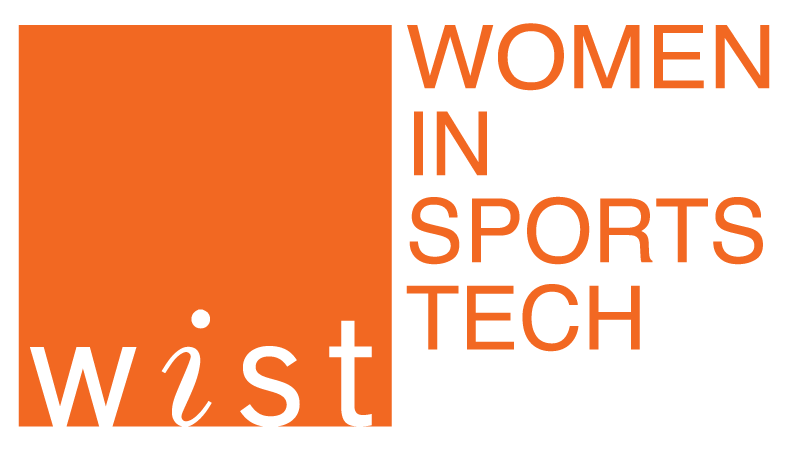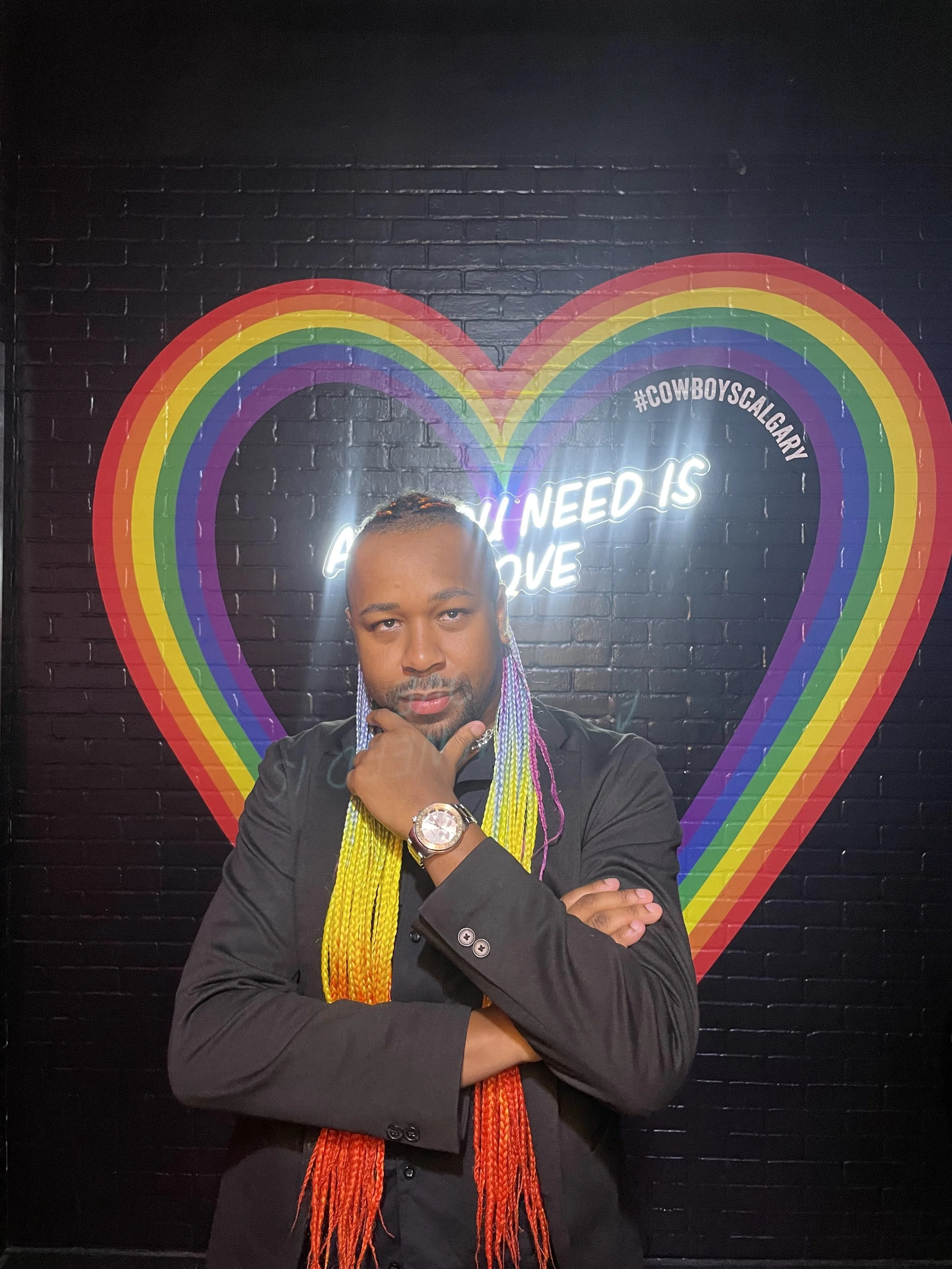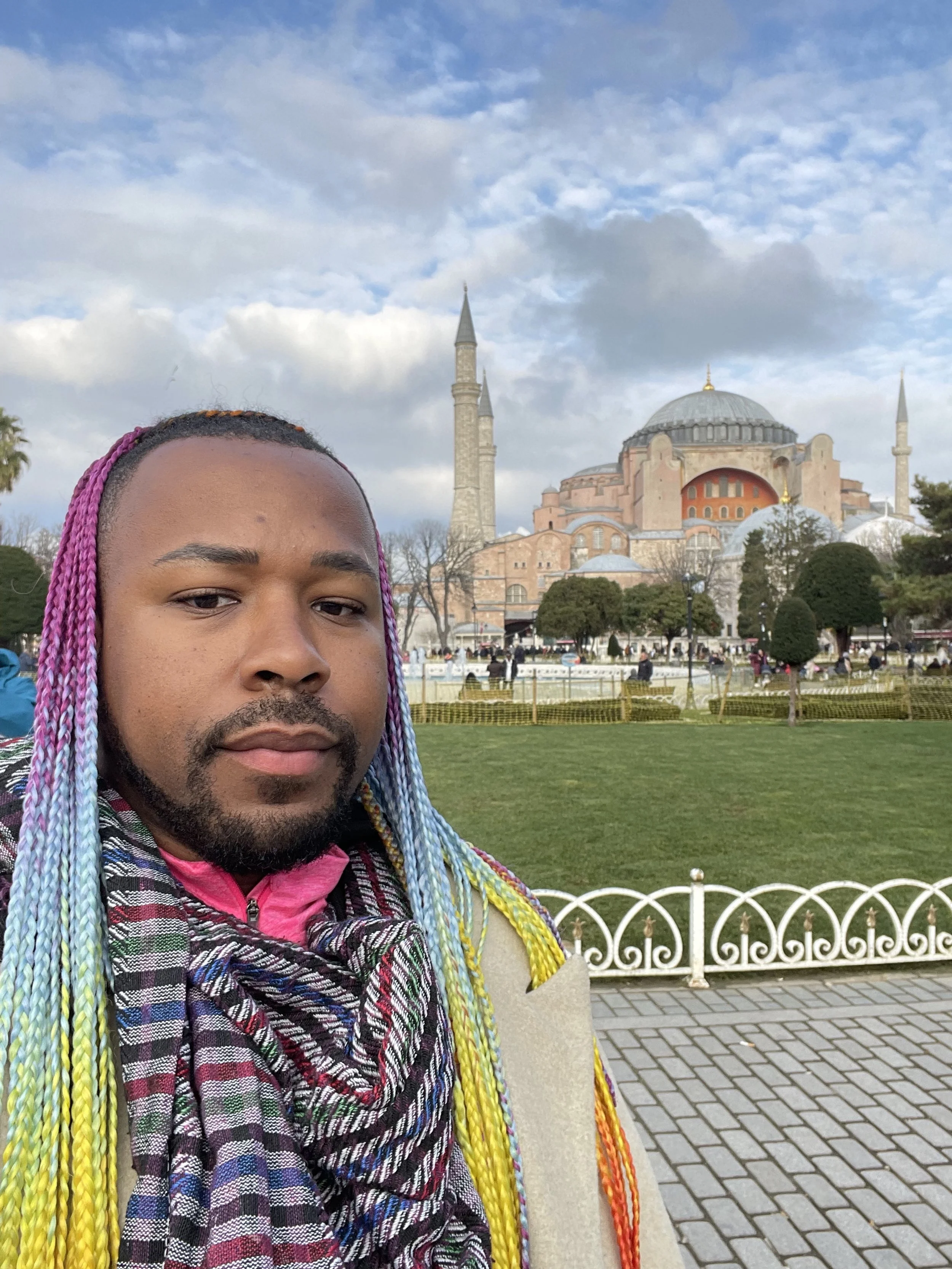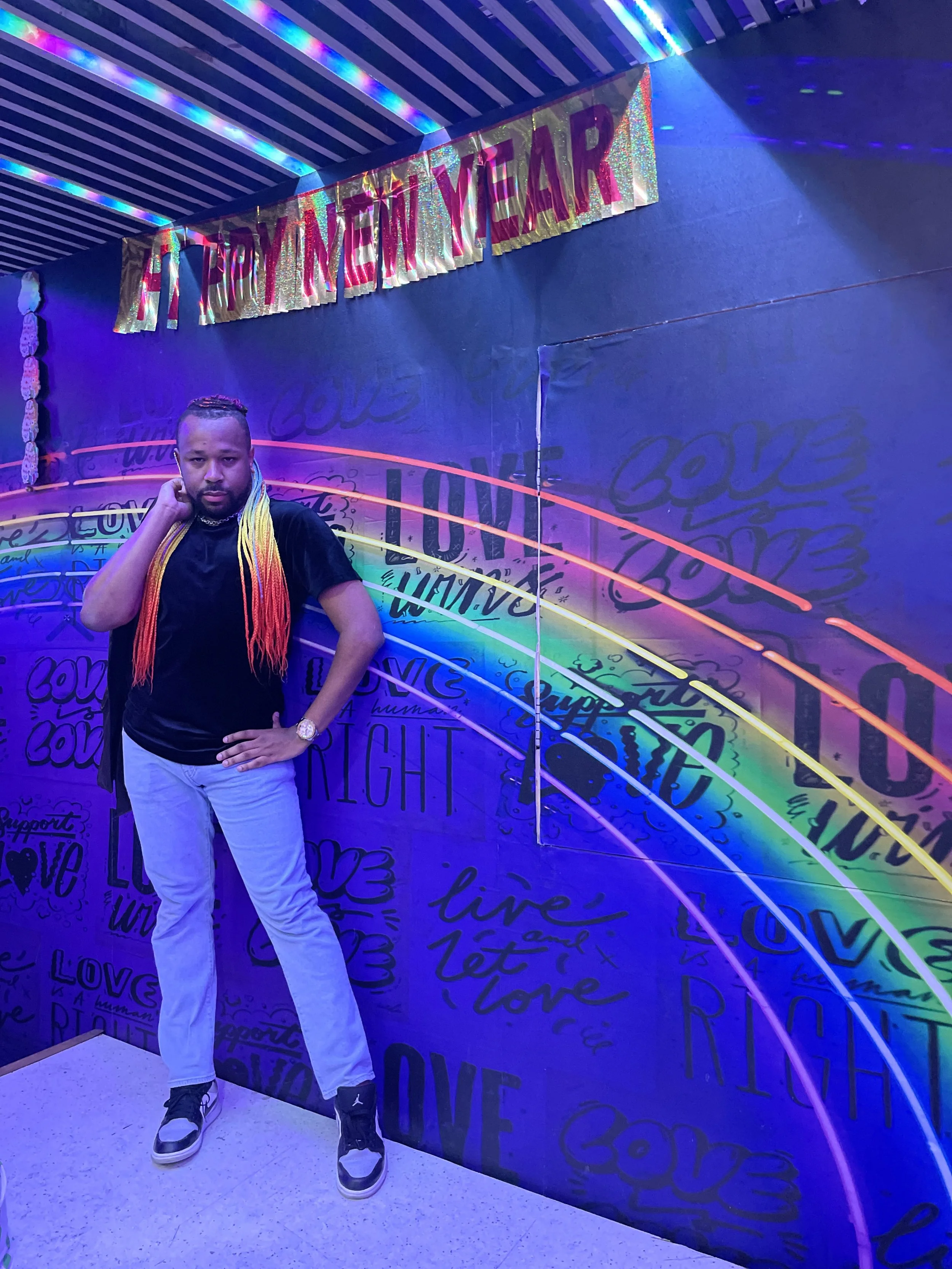Finding the Rainbow Connection - How Jarvis Sam Has Become a Powerful Voice of Inclusivity in Sports and Culture
WiST talks to people in sports and sports technology who embody a more diverse and inclusive workforce, setting the benchmark for their peers and future generations.
By Lisa Granatstein, Media Strategist and WiST Advisor
When you meet Jarvis Sam, you can’t help but be dazzled by his bright rainbow-colored braided hair. This warm smile and personable vibe convey an aura of openness and authenticity – all of which have served him well in his lifelong commitment to building inclusive workplace cultures.
Jarvis Sam is a founding board member emeritus for WiST. He currently serves as an advisor and WiST partner with The Rainbow Disruption.
For Jarvis, authenticity is not only about being true to himself and others. “For me, authenticity is the defining of a certain type of values and being unwilling to move away from or against those values at any and all costs.”
Values such as justice, peace, care and empathy were forged during his formative years in Houston, Texas, where he was the youngest of four children in a single-parent household. His mother, a strong, influential figure in his life, served as a foundation for what would become a remarkable career in technology and sports, and more recently as the Founder and CEO of The Rainbow Disruption, a DEI consultancy.
A graduate of Rice University, Jarvis studied History, Public Policy and Sport Management with an emphasis on race and gender rhetoric. He received his MBA from Brown University and IE School of Business.
But it was sports, namely playing volleyball, that were integral to Jarvis’ personal growth. It’s where he learned about leadership and teamwork, building connections and creating culture.
“Sports instilled in me so many amazing values that I carry through today – from how I lead and manage people to how I make connections with partners,” says Jarvis. “I didn’t necessarily want to be the captain of teams I played on, but rather to always show up as that leader who's committed to being the voice of reason, the voice of engagement, the voice of connection for the team.”
Jarvis began his career as a strategy and operations consultant with Deloitte Consulting in Houston, primarily focused on clients in the oil and gas industry. His big break in Big Tech came in the 2010s when he was hired by Google as a Diversity Program Manager to help redefine the search giant’s recruiting strategy. Later, Jarvis moved over to Snapchat as the messaging app’s first Head of Diversity & Inclusion.
When Nike came calling in 2018, Jarvis was ready for a change, having spent nearly four years successfully building Snap’s DEI culture against the backdrop of the company’s explosive growth and IPO. Seemingly, it was the perfect next step -- Jarvis could meld his expertise in DEI and drive diverse representation with his passion for sports.
Jarvis would be entering at a time of immense cultural transformation for the company as its people-first agenda was a clear priority, specifically with the amplification of Women’s voices and platforms within the organization and amongst its consumers. Given his role charged with building and leading the company’s first-ever DEI recruitment strategy connected to these efforts, Jarvis knew that this was exactly where he needed to be.
Over the course of the next five years, Jarvis held various roles, rising to Chief DEI Officer, where he diversified Nike’s talent pool and built large programs, partnerships and initiatives tied to representation, education, development and community. There were exciting collaborations with Nike athletes like Serena Williams and LeBron James, as well as league partners that included the WNBA and NFL.
Nike quickly went through a cultural transformation – three years ahead of schedule – with DEI becoming part of its purpose-driven mission and vision.
Last fall, Jarvis was ready to pass the baton and venture out on his own. He founded The Rainbow Disruption, a DEI advisory and consultancy firm, and became its CEO. He is also a founding board member emeritus for WiST and currently serves as an advisor and WiST partner with The Rainbow Disruption. Here, Jarvis shares his insights on diversity, the influence of sports and the power of ‘paying it forward.’
WiST: What was your motivation for founding The Rainbow Disruption?
I believe in the democratization of DEI practices and principles. I don't necessarily believe that all of the brain trust and commitment to the work should exist in just one company. I love to see companies become the gold standard, but their real impact is when they figure out how to open source this strategy to others in the industry and to others in different sectors. It isn’t a competition to see black professionals rise and be impactful in the footwear and apparel industry and retail spaces. Nike is just as critical as Adidas, at Under Armor, at Puma and at Reebok. I want to see us come together and drive workforce diversity and then let brand affinity become that differentiator for where talent goes to work. I wanted to be able to spread the knowledge and work I have been able to do and build across nonprofit, governmental agencies, academic institutions and fortune 500 companies.
WiST: How has the DEI conversation changed in the years since the death of George Floyd and the rise of the Black Lives Matter movement in 2020?
I would say the DEI conversation from 2020 into 2021 was one marked by massive corporate commitments to driving racial equity, supporting new nonprofit organizations that were working in the space, and tangible commitments to increasing the hiring of black and brown communities in the United States.
In March 2021, we saw the rise of #StopAsianHate. We started to see an additional peppering of approaches, and by late 2021 that there was a bit of corporate confusion. While companies were espousing perspectives that it's not a zero-sum game, we all can win, companies were losing sight of where and how they should be dividing resources - Asian American and Pacific Islanders have needs, the Black community has needs, and then you start to see the rise of Hispanic and Latino sentiment.
So, in 2022, we saw not the end but a better understanding and positionality of how to navigate the pandemic. Companies began exploring different options for returning to work. Some of it was virtual working, which impacted how conversations about DEI happened. It became less identity focused, where we have been the last two years, to become more structurally focused. While the differences between a cisgender black woman and a cisgender white woman are very different, the shared reality is if they are mothers, they have a deeply shared experience in figuring out how to return to work effectively and how to support their families. We have to be able to create resolutions and fellowships for specific groups and populations and people. But what’s more, how are we showing up as the leader and driver of the space?
For 2023, I think the sharp focus is going to be how do we reinvest in the same leaders that we installed in these big roles as chief diversity officers and as heads of DEI. Because the burnout that they're experiencing is incredibly real. For many of us, there is a lived experience connection to this work. So, it's not that I can just demonstrate empathy and connect and show up as leaders, right? When George Floyd was murdered, I also had to think about my experience as a Black man. How we reinvest in these leaders is going to be critical.
I’m a bit fearful because I have not seen the same structural organizational and individual accountability that we saw with the [corporate] commitments of over $50 billion to the Black community and racial equity. There's little to no accountability and standards that show where the money went or is going.
WiST: What are your thoughts on the power of sports as a conduit of cultural influence?
It's not lost on me that George Floyd was murdered on May 25, 2020, and it was on May 25, 2000, that Nelson Mandela uttered the very powerful words, “Sport has the power to change the world.” It speaks to kids in a language in which they understand. And I build on that, arguing that sports have the power to look beyond borders, language, values, religion and systems.
Athletes are more than who we see represented on the court or on the field. They develop a powerful platform that they can then use to make real social change. The notion of “shut up and dribble” is, at best, offensive and, at worst, a clear demonstration of the systems of structural oppression and radicalized hierarchy that underrepresented and especially Black communities are forced to face every single day.
WiST: With the benefit of years of knowledge, tools and experience you now possess, would there be anything that you would do differently earlier in your career?
Yes, start the journey of sharing these experiences even earlier. We reach a certain point in our professional careers where we have all these stories and narratives to share with others and hope that it will align with this concept of ‘lift as we climb’ and ‘pay it forward,’ but I think it is important that we develop safe spaces where people can share moments of failure and lack of meeting expectations more openly and more regularly so that they can highlight what they learned from the experiences and how others can learn and benefit from their POV and perspective. This is all about operating in a growth mindset where we do not see failure as an endpoint or stopping point but rather as an invitation or invocation of opportunity to do and be better.
To learn more about The Rainbow Disruption, visit here.




